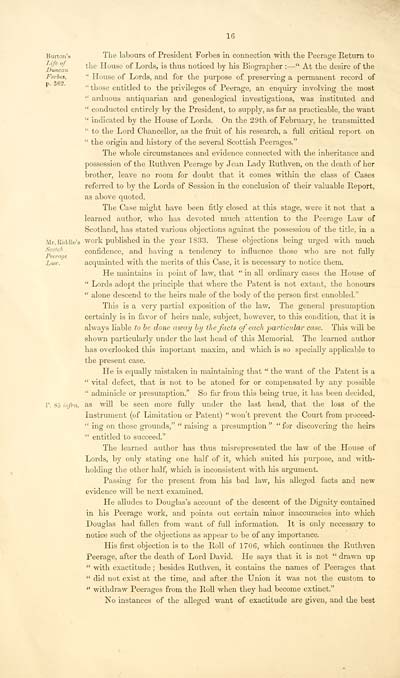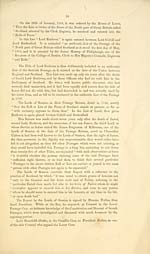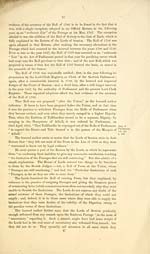Memorial as to the Ruthven peerage
(20) Page 16
Download files
Complete book:
Individual page:
Thumbnail gallery: Grid view | List view

16
Bmton's The labours of President Forbes in connection with the Peerage Return to
m O
Afe of ^ e jj ouse f Lords, is thus noticed by his Biographer : — " At the desire of the
Forbes, " House of Lords, and for the purpose of preserving a permanent record of
"those entitled to the privileges of Peerage, an enquiry involving the most
" arduovis antiquarian and genealogical investigations, was instituted and
" conducted entirely by the President, to supply, as far as practicable, the want
" indicated by the House of Lords. On the 29th of February, he transmitted
" to the Lord Chancellor, as the fruit of his research, a full critical report on
" the origin and history of the several Scottish Peerages."
The whole circumstances and evidence connected with the inheritance and
possession of the Ruthven Peerage by Jean Lady Ruthven, on the death of her
brother, leave no room for doubt that it comes within the class of Cases
referred to by the Lords of Session in the conclusion of their valuable Report,
as above quoted.
The Case might have been fitly closed at this stage, were it not that a
learned author, who has devoted much attention to the Peerage Law of
Scotland, has stated various objections against the possession of the title, in a
Mr. Riddle's work published in the year 1833. These objections being urged with much
Scotch confidence, and having a tendency to influence those who are not fully
Law. acquainted with the merits of this Case, it is necessary to notice them.
He maintains in point of law, that " in all ordinary cases the House of
" Lords adopt the principle that where the Patent is not extant, the honours
" alone descend to the heirs male of the body of the person first ennobled."
This is a very partial exposition of the law. The general presumption
certainly is in favor of heirs male, subject, however, to this condition, that it is
always liable to be done away by the facts of each particular case. This will be
shown particularly under the last head of this Memorial. The learned author
has overlooked this important maxim, and which is so specially applicable to
the present case.
He is equally mistaken in maintaining that " the want of the Patent is a
" vital defect, that is not to be atoned for or compensated by any possible
" adminicle or presumption." So far from this being true, it has been decided,
P. 85 infra, as will be seen more fully under the last head, that the loss of the
Instrument (of Limitation or Patent) " won't prevent the Court from proceed-
" ing on those grounds," "raising a presumption" "for discovering the heirs
" entitled to succeed."
The learned author has thus misrepresented the law of the House of
Lords, by only stating one half of it, which suited his purpose, and with-
holding the other half, which is inconsistent with his argument.
Passing for the present from his bad law, his alleged facts and new
evidence will be next examined.
He alludes to Douglas's account of the descent of the Dignity contained
in his Peerage work, and points out certain minor inaccuracies into which
Douglas had fallen from want of full information. It is only necessary to
notice such of the objections as appear to be of any importance.
His first objection is to the Roll of 1706, which continues the Ruthven
Peerage, after the death of Lord David. He says that it is not " drawn up
" with exactitude ; besides Ruthven, it contains the names of Peerages that
" did not exist at the time, and after the Union it was not the custom to
" withdraw Peerages from the Roll when they had become extinct."
No instances of the alleged want of exactitude are given, and the best
Bmton's The labours of President Forbes in connection with the Peerage Return to
m O
Afe of ^ e jj ouse f Lords, is thus noticed by his Biographer : — " At the desire of the
Forbes, " House of Lords, and for the purpose of preserving a permanent record of
"those entitled to the privileges of Peerage, an enquiry involving the most
" arduovis antiquarian and genealogical investigations, was instituted and
" conducted entirely by the President, to supply, as far as practicable, the want
" indicated by the House of Lords. On the 29th of February, he transmitted
" to the Lord Chancellor, as the fruit of his research, a full critical report on
" the origin and history of the several Scottish Peerages."
The whole circumstances and evidence connected with the inheritance and
possession of the Ruthven Peerage by Jean Lady Ruthven, on the death of her
brother, leave no room for doubt that it comes within the class of Cases
referred to by the Lords of Session in the conclusion of their valuable Report,
as above quoted.
The Case might have been fitly closed at this stage, were it not that a
learned author, who has devoted much attention to the Peerage Law of
Scotland, has stated various objections against the possession of the title, in a
Mr. Riddle's work published in the year 1833. These objections being urged with much
Scotch confidence, and having a tendency to influence those who are not fully
Law. acquainted with the merits of this Case, it is necessary to notice them.
He maintains in point of law, that " in all ordinary cases the House of
" Lords adopt the principle that where the Patent is not extant, the honours
" alone descend to the heirs male of the body of the person first ennobled."
This is a very partial exposition of the law. The general presumption
certainly is in favor of heirs male, subject, however, to this condition, that it is
always liable to be done away by the facts of each particular case. This will be
shown particularly under the last head of this Memorial. The learned author
has overlooked this important maxim, and which is so specially applicable to
the present case.
He is equally mistaken in maintaining that " the want of the Patent is a
" vital defect, that is not to be atoned for or compensated by any possible
" adminicle or presumption." So far from this being true, it has been decided,
P. 85 infra, as will be seen more fully under the last head, that the loss of the
Instrument (of Limitation or Patent) " won't prevent the Court from proceed-
" ing on those grounds," "raising a presumption" "for discovering the heirs
" entitled to succeed."
The learned author has thus misrepresented the law of the House of
Lords, by only stating one half of it, which suited his purpose, and with-
holding the other half, which is inconsistent with his argument.
Passing for the present from his bad law, his alleged facts and new
evidence will be next examined.
He alludes to Douglas's account of the descent of the Dignity contained
in his Peerage work, and points out certain minor inaccuracies into which
Douglas had fallen from want of full information. It is only necessary to
notice such of the objections as appear to be of any importance.
His first objection is to the Roll of 1706, which continues the Ruthven
Peerage, after the death of Lord David. He says that it is not " drawn up
" with exactitude ; besides Ruthven, it contains the names of Peerages that
" did not exist at the time, and after the Union it was not the custom to
" withdraw Peerages from the Roll when they had become extinct."
No instances of the alleged want of exactitude are given, and the best
Set display mode to:
![]() Universal Viewer |
Universal Viewer | ![]() Mirador |
Large image | Transcription
Mirador |
Large image | Transcription
Images and transcriptions on this page, including medium image downloads, may be used under the Creative Commons Attribution 4.0 International Licence unless otherwise stated. ![]()
| Histories of Scottish families > Memorial as to the Ruthven peerage > (20) Page 16 |
|---|
| Permanent URL | https://digital.nls.uk/95642671 |
|---|
| Description | A selection of almost 400 printed items relating to the history of Scottish families, mostly dating from the 19th and early 20th centuries. Includes memoirs, genealogies and clan histories, with a few produced by emigrant families. The earliest family history goes back to AD 916. |
|---|

